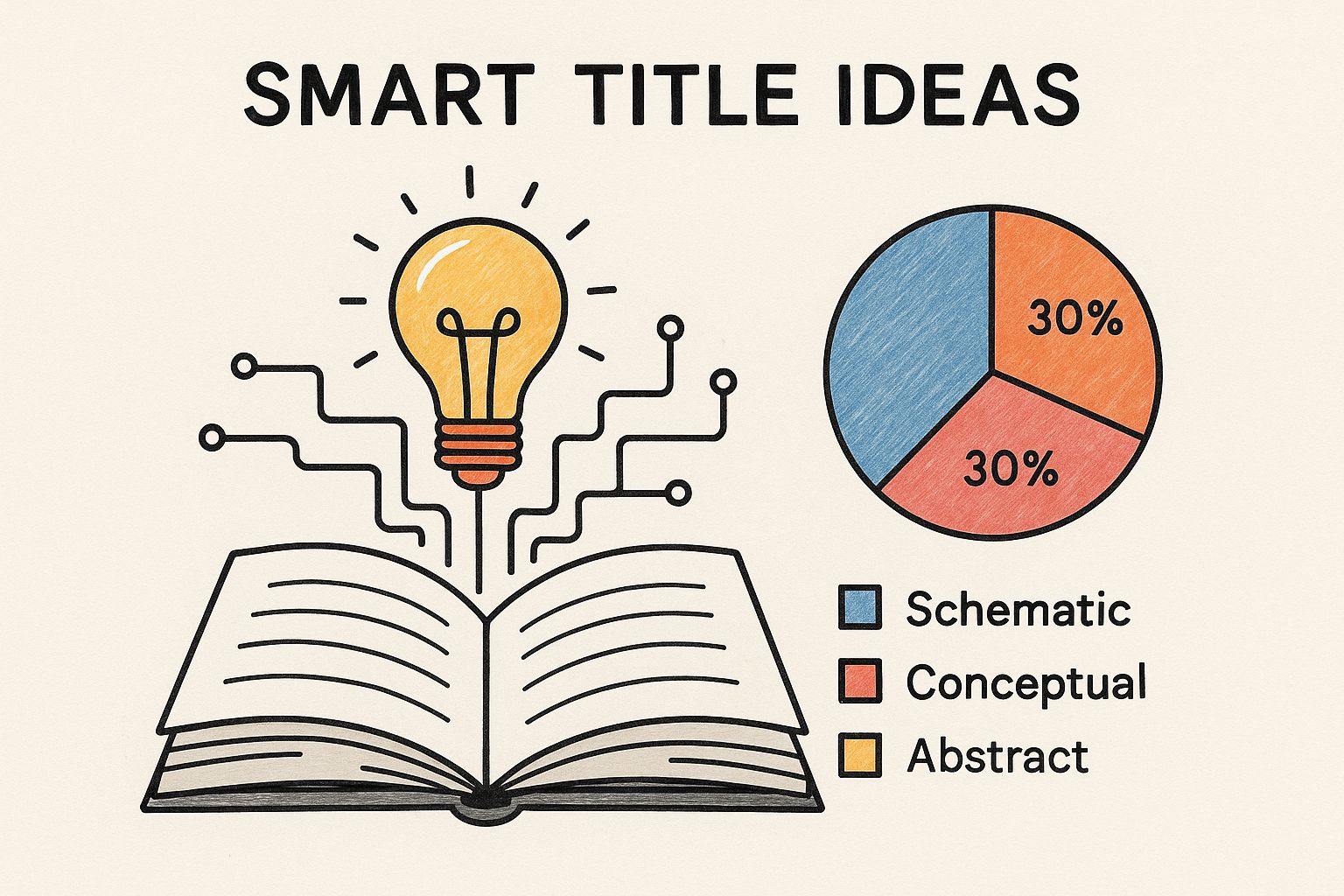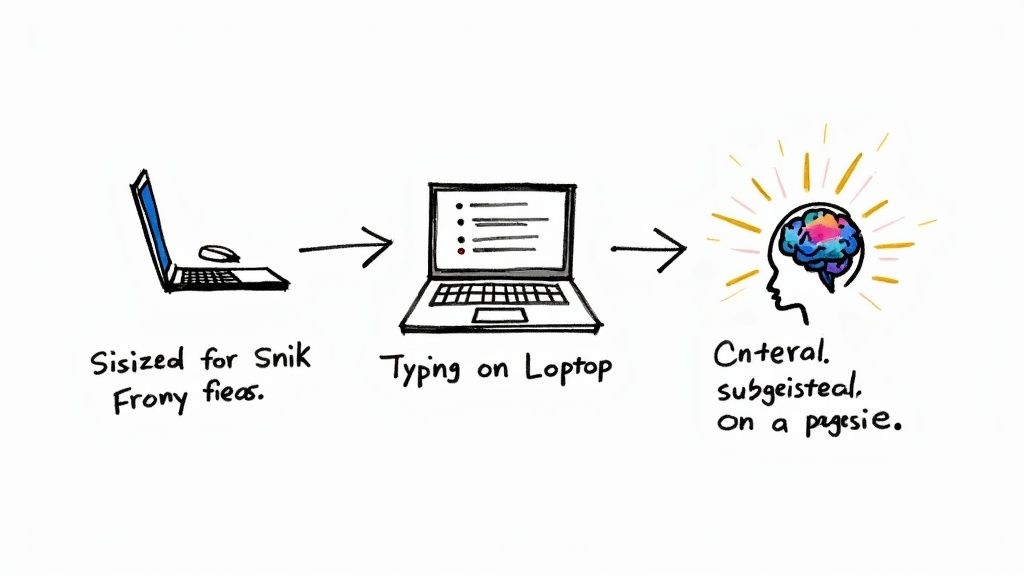Winning Titles with AI For Book Title Suggestions

That familiar, paralyzing feeling of staring at a blank page, trying to conjure the perfect book title? It's a rite of passage for authors. But what if you could trade that guesswork for data-driven inspiration? Using AI for book title suggestions does just that, turning a creative slog into an exciting collaboration.
Instead of just you, your coffee, and a thesaurus, you get an assistant that has analyzed countless market trends, bestselling books, and reader preferences to serve up compelling, commercially viable titles in minutes. This isn't about replacing your creative spark; it's about giving it a powerful boost with insights you couldn't possibly gather on your own.
How AI Is Changing the Book Titling Game
We’ve all been there: endless brainstorming sessions, bugging friends and family for feedback, and ultimately, taking a shot in the dark. While gut instinct is a huge part of the creative process, this old-school method can be a real time-sink and frankly, pretty draining. The arrival of AI tools represents a fundamental shift. We're moving away from pure intuition and into a hybrid model that marries artistic vision with smart data.
Think of these platforms less as "generators" and more as sophisticated research partners. They can digest the core themes of your manuscript, pinpoint your ideal reader, and suggest titles that feel right at home in your genre. It's not about outsourcing your creativity; it's about arming yourself with a much stronger starting point. For a wider look at how this works in content creation, you can see how professionals use AI tools like Cursor & Claude to automate content.
A quick comparison shows just how much AI can improve the titling process:
AI Titling vs Traditional Brainstorming
| Aspect | Traditional Brainstorming | AI-Assisted Titling |
|---|---|---|
| Speed | Can take hours or even days. | Generates dozens of ideas in seconds. |
| Data Input | Relies on personal knowledge and small feedback groups. | Analyzes vast datasets of bestsellers and market trends. |
| Objectivity | Highly subjective, influenced by personal bias. | Provides data-backed, market-aware suggestions. |
| Scope | Limited to the creator's immediate imagination. | Explores a wide range of creative and stylistic angles. |
| SEO | Keyword optimization is a separate, manual step. | Often incorporates relevant, high-traffic keywords naturally. |
As you can see, integrating AI doesn't just speed things up—it adds a strategic layer that was previously out of reach for most individual authors.
From Hours to Seconds
The sheer speed is what first grabs most authors. AI book title generators have completely changed the game by drawing on huge databases of successful titles, trending keywords, and what readers actually want. In 2024, tools like PaperGen.ai showed that AI can produce a ton of relevant title ideas in seconds, drastically cutting down that initial brainstorming phase.
This efficiency means your valuable time is spent refining the gold, not digging for it.
Beyond the Title Itself
The benefits of this data-first approach ripple outward, impacting more than just your cover. The insights you gain can directly shape your subtitle, your back cover copy, and even your book’s essential keywords.
By figuring out what connects with your target audience from the get-go, you're building a cohesive marketing package that seriously boosts discoverability. The keywords and phrases an AI suggests are often the very same ones readers are typing into search bars.
This tight link between your title and its marketability is absolutely vital for success. To really dig into this, take a look at our guide on how to use AI for book metadata SEO and give your book the best possible chance of being found. At the end of the day, a well-chosen, AI-assisted title works much harder for you long after the writing is done.
Finding the Right AI Tool for Your Book's Genre
Let’s be honest, not all AI title generators are cut from the same cloth. The secret is finding a tool that genuinely understands your book's genre and specific needs. It’s a bit like painting—you wouldn't use a wide brush for fine details. The same logic applies here; your AI tool needs to match your creative work.
If you're writing non-fiction, you’ll want a tool that’s heavy on SEO and keyword analysis. These platforms are brilliant at finding titles that are not just descriptive, but also easy for readers to find when they're searching online for your topic. On the flip side, if you're a novelist penning a romance, thriller, or fantasy epic, your focus should be on tools that deliver creative and stylistic punch.
This is where human creativity meets smart AI analysis to find that perfect title.
Subscribe & Get Your Free Marketing Plan Template
Receive regular updates on marketing best-practices, AI shortcuts, and get our proven 4-phase marketing roadmap for free.
Unsubscribe anytime.

Key Features That Actually Matter
As you start exploring different AI platforms, zero in on the features that give you real control over the suggestions you get.
Here’s what I always look for:
- Genre Specificity: This is a big one. A great tool has to know the difference between a cozy mystery and a hard-boiled detective novel. It’s a non-negotiable feature.
- Tone Adjustment: You need to be able to match the AI’s tone to your own narrative voice. Is your book witty, academic, or full of suspense? The tool should be able to reflect that.
- Manuscript Analysis: The best tools can actually dig into your manuscript. They look at your core themes, character journeys, and even key plot twists to come up with suggestions that feel connected to the heart of your story.
This deep analysis is what separates a generic, forgettable title from one that feels like it was born from your manuscript itself.
When it comes to the current AI scene, there are some fantastic specialized options out there. Some of the best AI content generation tools can do more than just titles; they can help with your entire creative and marketing workflow.
For a deep dive tailored specifically for writers, I’ve put together a guide on the https://manuscriptreport.com/blog/12-best-ai-tools-for-authors. It's a great starting point to find a platform that feels like it was made just for you.
How to Craft Prompts That Actually Generate Winning Titles
The secret to getting great book titles from AI isn't the tool itself—it’s you. Your deep, intimate knowledge of your story is the one thing the AI doesn't have. If you just toss it a lazy, one-line request like "Suggest titles for my fantasy book," you're going to get back a list of generic, unusable clichés.
Think of it this way: you can't expect a gourmet meal if you only give the chef a can of beans. You need to provide the right ingredients. Your prompt is the creative brief that guides the AI toward genuinely compelling ideas. The more context you feed it, the more insightful the suggestions will be.

What Details Do I Need to Include?
To get the AI on the right track, your first prompt should be a rich paragraph packed with key details about your book. Don't be shy here; the AI needs this information to grasp the heart of your narrative.
Make sure your prompt always includes these core elements:
- Genre and Subgenre: Get specific. Instead of just "Fantasy," try "YA Urban Fantasy with a slow-burn romance subplot." The more precise you are, the better.
- Core Themes: What are the big ideas? List them out. For instance, "Key themes include betrayal, found family, and the high cost of power."
- Plot Summary: A quick, two-sentence synopsis covering the main conflict is all you need.
- Characters and Conflicts: Mention the protagonist and their central struggle. Something like, "An outcast witch must team up with her sworn vampire rival to save her coven."
- Target Audience: Who are you writing for? Define them by the authors they already love. "This is for readers who enjoy Sarah J. Maas and Leigh Bardugo."
My Favorite Trick: If you've ever written a query letter, that pitch paragraph is gold. It’s concise, comprehensive, and practically designed to be the perfect foundational prompt for an AI title generator.
Putting It All Together: Real-World Prompt Examples
Let's see what this looks like in practice.
Here’s a prompt I might write for a thriller: "Suggest 10 tense, one-to-three-word titles for a psychological thriller. A disgraced journalist in Seattle uncovers a massive corporate conspiracy but gets framed as the prime suspect in her source's murder. Themes are paranoia, gaslighting, and the dangerous price of truth. The target audience loves books by Ruth Ware."
Now, for a romance, you'd want a completely different vibe: "Generate 10 whimsical, heartwarming titles for a contemporary romance. Two rival bakers in a small Vermont town are forced to share a kitchen during a holiday baking competition and end up falling for each other. It’s an enemies-to-lovers story about finding a sense of home. Think fans of Emily Henry."
See the difference? Both prompts give the AI crucial guardrails, like word count constraints and comparative authors, which provide clear stylistic direction. This level of detail is what separates a frustrating, time-wasting session from a genuinely creative and fruitful one.
Refining AI Suggestions into the Perfect Title
So, the AI has handed you a list of potential titles. Some might be brilliant, others a bit off the mark. Now comes the fun part, where your own judgment and creativity take center stage. Think of the AI's output as a brainstorming partner's raw notes—it's your job to find the gold.
First things first, read your favorites out loud. Seriously. Say them to your dog, your houseplant, whoever will listen. How do they sound? Do they flow smoothly, or do you trip over the words? A title that's easy to say is also easy for a reader to recommend to a friend. That kind of word-of-mouth is marketing you can't buy.
Next, gut-check each one for emotional pull. Your title is a tiny, potent promise. Does it hint at the suspense, the romance, the laugh-out-loud humor you’ve poured into your pages? The right title should feel like the key that unlocks the book's core emotion for the reader.
Vet Your Top Contenders
Once you’ve narrowed it down to a shortlist—maybe three to five real contenders—it's time to do a little homework. Skipping this step can lead to major headaches down the road, so it’s worth the effort.
- Check for Conflicts: Run a search for your top choices on Amazon, Goodreads, and just a general Google search. Is another book already out there with the same title, especially in your genre? A little overlap can happen, but you don't want a reader buying someone else's book by mistake.
- Align with Your Brand: Think about your author brand. If you're known for dark, gritty thrillers, a lighthearted, whimsical title will feel out of place and confuse your loyal readers. Consistency is key.
- Test for Memorability: Send your top picks to a few trusted friends or beta readers. Don't give them any context. A day later, ask them which ones they remember. The titles that stick in their minds are usually the strongest.
A great title isn't just about sounding cool; it's about being clear, memorable, and unique enough to claim its own space in a crowded market. It’s the first and most important piece of your book's marketing.
Create a Hybrid Masterpiece
Remember, you don't have to take any of the AI's suggestions exactly as they are. In my experience, the absolute best titles often come from a bit of creative Frankenstein-ing.
You might fall in love with a powerful verb from one suggestion and a compelling phrase from another. Go ahead and mix and match. Splice them together. Tweak a word here or there. This is where you combine the AI's analytical power with your own creative instinct. The result is a title that’s not just algorithm-approved, but a true reflection of your book and your vision. It’s collaboration, not automation.
Integrating Your New Title into Your Marketing
You’ve landed on the perfect title, likely with a little help from AI. Fantastic. But don't just slap it on the cover and call it a day. A great title is your single most powerful marketing asset, and its real work is just beginning. Think of it as the central pillar of your entire promotional strategy—the hook that needs to appear everywhere to create a consistent, compelling message for readers.
First things first, let's look at your book description. The core concepts of your new title need to be front and center in your blurb. If your AI-assisted title hints at "forgotten magic" and "a city of secrets," you’d better believe those ideas should feature prominently in your description. This creates an immediate, satisfying connection for the reader and reassures them that the book will deliver on the title's promise.

Unify Your Brand and Discoverability
With the description updated, it's time to let the title’s tone and keywords shape the rest of your strategy. This is how you make every piece of your marketing work together.
- Cover Design: Your title is the creative brief for your cover designer. Hand them the title and its most potent keywords. A title like "The Last Starlight" immediately suggests a very different color palette and feel than something like "Blood in the Dust."
- Amazon Keywords: Remember those keywords you fed the AI to get your title ideas? Those are gold. They're almost certainly the same terms readers are typing into Amazon's search bar. Make sure they form the foundation of your Amazon KDP keyword strategy to get your book found.
The insights from this process go far beyond just the title itself. The broader trend of using AI in content creation is accelerating. By 2026, it's expected to be even more commonplace. We're already seeing creators on platforms like YouTube discover that AI-refined titles can significantly boost view counts, which is a clear signal of audience preference.
Expert Tip: Don't let the good ideas stop with the title. Use the themes and successful phrases from your brainstorming sessions to inspire blog post headlines, social media updates, and ad copy. This creates a cohesive marketing ecosystem where every element reinforces the others.
This approach turns your marketing from a series of disconnected tasks into a unified, powerful campaign. And once you're comfortable with titles, you can explore other AI book marketing tactics to streamline your efforts even further.
For authors who really want to get ahead of the curve, it’s worth digging into resources on mastering content marketing automation to see how you can tie all these promotional activities together seamlessly.
Got Questions About Using AI for Book Titles?
When I first started talking to authors about using AI for things like book titles, I noticed the same handful of questions always came up. It makes sense. Handing over even a piece of a creative process that's so personal feels a bit strange at first.
Let's walk through those common worries. Getting these answers straight will help you see these tools for what they are: a powerful new assistant, not a replacement for your own genius.
Will an AI-Generated Title Actually Be Original?
This is the big one, isn't it? The short answer is yes, but you're still the creative director.
AI tools aren't plucking existing titles from a database. They're weaving together new ideas based on the patterns, language, and concepts they've learned. The output is more like a pile of unique, high-quality lumber than a pre-fabricated house.
It's your job to take those raw materials—the best phrases, words, and concepts—and build something truly yours. Tweak them, combine them, and let them spark new ideas.
Before you fall in love with a title, you absolutely must do your homework. Search for it on Amazon, Goodreads, and Google. The last thing you want is to accidentally pick a title that's already in use, especially in your genre. That's a fast track to confusing readers and losing sales.
Can This Really Work for Non-Fiction?
Oh, absolutely. I'd argue AI is even more of a secret weapon for non-fiction authors. Discoverability is the name of the game in non-fiction, and AI is brilliant at thinking like a search engine.
Instead of just brainstorming catchy phrases, you can feed the AI prompts built around what your readers are actually looking for. Think about it:
- Their Biggest Problem: What's the nagging issue that keeps your ideal reader up at night?
- Your Unique Solution: How does your book solve that specific problem?
- The Words They Use: What terms would they type into Google or Amazon to find a book like yours?
Using this method gives you titles that aren't just compelling; they're magnets for the right audience.
Am I "Cheating" if I Use AI for My Book Title?
Let's be real: is using a thesaurus cheating? What about a spellchecker, a critique partner, or a professional editor? Of course not.
Think of AI as the most advanced brainstorming partner you've ever had. It's a tool, plain and simple. It’s here to give your creativity a boost with powerful data, not to take over your job.
You're still the author. You make the final call. The artistic vision, the heart of the book, and the ultimate decision—that all comes from you.
Ready to stop wrestling with marketing and get back to writing? ManuscriptReport.com delivers a full-stack marketing report for your book in about 10 minutes, packed with everything from blurbs and keywords to ad copy and social media posts. Get your comprehensive report today.
Enjoyed this article? Subscribe for more + get a free marketing roadmap template.
Receive regular updates on marketing best-practices, AI shortcuts, and get our proven 4-phase marketing roadmap template for free.
Unsubscribe anytime.
Related Articles

The Ultimate Affordable Book Launch Checklist: 9 Essential Steps for 2026
Complete affordable book launch checklist for 2026. Follow 9 proven steps—from budget planning to post-launch—for indie and self-published authors. Launch successfully for under $500.

How to Write Viral Book Hooks: 10 Proven Strategies for Social Media Success
Master the art of viral book hooks with 10 proven strategies, platform-specific tactics, and templates that grab attention on BookTok, Instagram, and beyond.

7 Must-Have AI Writing Tools for Authors
Discover essential AI writing tools for authors to boost creativity and streamline marketing. Learn actionable tips and explore solutions like ManuscriptReport.com.